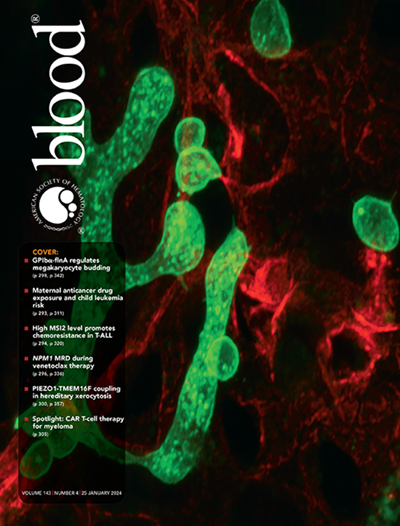增强的CD47表达损害同种异体hct后的同种异体反应性t细胞清除。
IF 21
1区 医学
Q1 HEMATOLOGY
引用次数: 0
摘要
移植物抗宿主病(GvHD)是同种异体造血细胞移植(alloo - hct)后最常见的非复发并发症。GvHD治疗的一个关键目标是抑制炎症。炎性细胞的吞噬清除在很大程度上有助于炎性过程的终止。然而,吞噬作用在GvHD中的确切功能在很大程度上仍不清楚。在这项研究中,我们确定了“不要吃我”信号CD47作为治疗干预的一个有希望的靶标,旨在根除同种异体hct后的同种异体反应性t细胞。对全球数据集的分析显示,炎症肠患者回肠中t细胞CD47表达显著上调。基于这一发现,我们在allo-HCT后检测了胃肠道(GIT)中的CD47水平。我们的工作不仅证实了GvHD患者GIT中CD47的表达上调,而且还鉴定了同种异体造血干细胞移植后GvHD小鼠回肠中t细胞上的CD47。此外,我们发现激活的供体t细胞在体外通过CD47信号抑制抗体依赖性细胞吞噬(ADCP)。应用抗cd47抗体可显著活化受损的活化t细胞ADCP。给小鼠注射抗cd47抗体可提高GIT中t细胞的吞噬,诱导免疫抑制反应并提高生存率。最后,移植CD47缺陷供体t细胞可显著提高GvHD临床评分,并提高同种异体造血干细胞移植后的生存率。总的来说,我们的研究结果阐明了CD47上调是GvHD患者的关键机制,导致同种异体反应性t细胞的吞噬清除受损。本研究表明,抗cd47治疗可以纠正同种异体反应性t细胞的吞噬受损,从而有助于解决同种异体hct后的炎症。本文章由计算机程序翻译,如有差异,请以英文原文为准。
Augmented CD47 expression impairs alloreactive T-cell clearance after allo-HCT.
Graft-versus-Host disease (GvHD) ensues as the most common non-relapse complication after allogeneic hematopoietic cell transplantation (allo-HCT). A pivotal goal in GvHD management revolves around quelling inflammation. Phagocytic clearance of inflammatory cells contributes substantially to termination of inflammatory processes. Nevertheless, the precise functions of phagocytosis in GvHD remain largely unclear. In this study, we identified the "don't eat me"-signal CD47 as a promising target for therapeutic interventions aimed at eradicating alloreactive T-cells subsequent to allo-HCT. Analysis of global data sets revealed a remarkable upregulation of CD47 expression on T-cells residing in the ileum of patients with inflamed intestine. Building on this finding, we examined CD47 levels in the gastrointestinal tract (GIT) following allo-HCT. Our work not only confirmed upregulated CD47 expression in the GIT of GvHD patients, but also identified CD47 on T-cells in the ileum of GvHD mice after allo-HCT. Additionally, we found that activated donor T-cells suppress antibody-dependent cellular phagocytosis (ADCP) via CD47 signaling in vitro. Application of anti-CD47 antibodies significantly invigorated the impaired ADCP of activated T-cells. Administering anti-CD47 antibodies to mice elevated phagocytosis of T-cells in the GIT, induced immunosuppressive responses and improved survival. Finally, transplantation of CD47 deficient donor T-cells significantly improved clinical GvHD score with improved survival after allo-HCT. Collectively, our findings illuminate CD47 upregulation as pivotal mechanism in GvHD patients, leading to impaired phagocytic clearance of alloreactive T-cells. This study proposes that anti-CD47 treatment could rectify the compromised phagocytosis of alloreactive T-cells, thereby aiding in the resolution of inflammation after allo-HCT.
求助全文
通过发布文献求助,成功后即可免费获取论文全文。
去求助
来源期刊

Blood
医学-血液学
CiteScore
23.60
自引率
3.90%
发文量
955
审稿时长
1 months
期刊介绍:
Blood, the official journal of the American Society of Hematology, published online and in print, provides an international forum for the publication of original articles describing basic laboratory, translational, and clinical investigations in hematology. Primary research articles will be published under the following scientific categories: Clinical Trials and Observations; Gene Therapy; Hematopoiesis and Stem Cells; Immunobiology and Immunotherapy scope; Myeloid Neoplasia; Lymphoid Neoplasia; Phagocytes, Granulocytes and Myelopoiesis; Platelets and Thrombopoiesis; Red Cells, Iron and Erythropoiesis; Thrombosis and Hemostasis; Transfusion Medicine; Transplantation; and Vascular Biology. Papers can be listed under more than one category as appropriate.
 求助内容:
求助内容: 应助结果提醒方式:
应助结果提醒方式:


